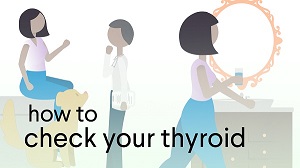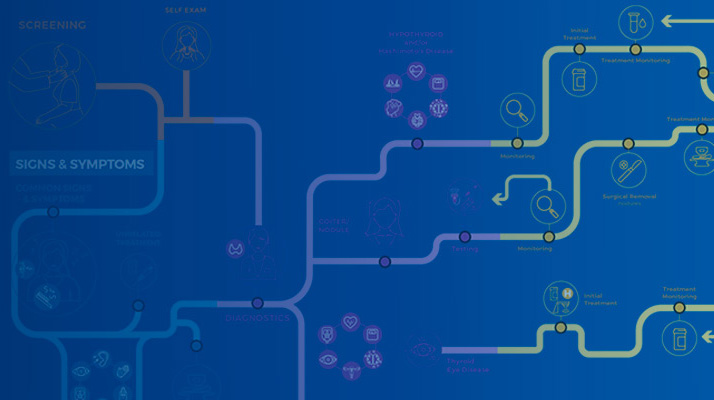What Is Hypothyroidism?
An underactive thyroid, or hypothyroidism, occurs when the thyroid gland creates less than the normal amount of thyroid hormone. The result is the “slowing down” of many bodily functions. Hypothyroidism usually is a permanent condition that can be treated. Of the nearly 30 million people estimated to be suffering from thyroid dysfunction, most have hypothyroidism.
What Causes Hypothyroidism?
- Autoimmune thyroiditis: The body’s immune system may produce a reaction in the thyroid gland that results in hypothyroidism and, most often, a goiter (enlargement of the thyroid). Other autoimmune diseases may be associated with this disorder, and additional family members may also be affected.
- Central or pituitary hypothyroidism: Thyroid-stimulating hormone (TSH) is produced by the pituitary gland, which is located behind the nose at the base of the brain. Any destructive disease of the pituitary gland or hypothalamus, which sits just above the pituitary gland, may cause damage to the cells that secrete TSH, which stimulates the thyroid to produce normal amounts of thyroid hormone. This is a very rare cause of hypothyroidism.
- Congenital hypothyroidism: An infant may be born with an inadequate amount of thyroid tissue or an enzyme defect that does not allow normal thyroid hormone production. If this condition is not treated promptly, physical stunting and/or intellectual impairment may develop.
- Medications: Lithium, high doses of iodine and amiodarone — an antiarrhythmic agent used for various types of cardiac dysrhythmias — can cause hypothyroidism.
- Postpartum thyroiditis: Five percent to 10 percent of women develop mild to moderate hyperthyroidism within several months of giving birth. Hyperthyroidism in this condition usually lasts for approximately one to two months. It is often followed by several months of hypothyroidism, but most women will eventually recover normal thyroid function. This condition may occur again with subsequent pregnancies.
- Radioactive iodine treatment: Hypothyroidism frequently develops as a desired therapeutic goal after the use of radioactive iodine treatment for hyperthyroidism.
- Silent thyroiditis: Transient (temporary) hyperthyroidism can be caused by silent thyroiditis, a condition which appears to be the same as postpartum thyroiditis but not related to pregnancy. It is not accompanied by a painful thyroid gland.
- Subacute thyroiditis: This condition may follow a viral infection and is characterized by painful thyroid gland enlargement and inflammation, which results in the release of large amounts of thyroid hormone into the blood. Fortunately, this condition usually resolves spontaneously. The thyroid usually heals itself over several months, but often not before a temporary period of hypothyroidism occurs.
- Thyroid surgery: Hypothyroidism may be related to surgery on the thyroid gland, especially if most of the thyroid has been removed.
What Are Common Symptoms of Hypothyroidism?
In its earliest stage, hypothyroidism may cause few symptoms, since the body has the ability to partially compensate for a failing thyroid gland by increasing the stimulation to it, much like pressing down on the accelerator when climbing a hill to keep the car going the same speed. As thyroid hormone production decreases, and the body’s metabolism slows, you may experience some of the following symptoms:
- Pervasive fatigue
- Drowsiness
- Forgetfulness
- Difficulty with learning
- Dry, brittle hair and nails
- Dry, itchy skin
- Puffy face
- Constipation
- Sore muscles
- Weight gain and fluid retention
- Heavy and/or irregular menstrual flow
- Increased frequency of miscarriages
- Increased sensitivity to cold
How Is Hypothyroidism Diagnosed?
Symptoms and physical signs can signal hypothyroidism. However, the condition may develop slowly, so many people do not realize that their body has changed.
A primary care physician may make the diagnosis of hypothyroidism, but assistance is often needed from an endocrinologist, a specially trained doctor who is qualified to diagnose and treat hormone-related conditions, including diseases related to the thyroid gland.
Find endocrine care in your area.
What Tests Are Used to Help Determine Hypothyroidism?
- TSH (thyroid-stimulating hormone or thyrotropin): An increased TSH level in the blood is the most accurate indicator of hypothyroidism. Production of TSH is increased when the thyroid gland even slightly underproduces thyroid hormone.
- Estimates of thyroxine (T4) test: This measures the level of T4 in your blood. Note that there is a range of free T4 levels in the blood of normal people, so a value of free thyroxine that is “within normal limits” for the general population may not be appropriate for everyone.
- Thyroid antibodies: Indicates the likelihood of auto-immune thyroiditis being the cause of hypothyroidism.
Visit our Journey for Patients with Thyroid Disease to learn more about Hypothyroidism diagnosis.
Learn More
How Is Hypothyroidism Treated?
Hypothyroidism is generally treated with a single daily dose of levothyroxine, given as a tablet. The correct dosage can help return the thyroid balance to normal. It is essential to take the medication as prescribed.
- A dose that is too high can cause symptoms of hyperthyroidism, create excessive strain on the heart and lead to an increased risk of developing osteoporosis.
- A dose of thyroid hormone that is too low may fail to prevent enlargement of the thyroid gland, allow symptoms of hypothyroidism to persist, and be associated with increased serum cholesterol levels, which may increase the risk for atherosclerosis and heart disease.
- Older people who may have underlying heart disease are usually started on a low dose of levothyroxine, which is gradually increased. Thyroid hormone acts slowly in some parts of the body, so it may take several months after treatment is started for all symptoms to improve.
Since most cases of hypothyroidism are permanent, it is usually necessary to treat the condition throughout one’s lifetime. Medication doses may have to be periodically adjusted. Also, various medications and supplements (particularly iron) may affect the absorption of thyroid hormone, so the levels may need more frequent monitoring during illness or changes in medication and supplements.
Appropriate management of hypothyroidism requires continued care by a physician experienced in the treatment of this condition.
Visit our Journey for Patients with Thyroid Disease to learn more about hypothyroidism treatment options.
Learn More
Hypothyroidism and Pregnancy
It is important that women with hypothyroidism who plan to become pregnant keep their thyroid hormone levels well adjusted, since hypothyroidism can affect the development of the baby. During pregnancy, thyroid hormone replacement requirements often change, so more frequent monitoring is necessary.




